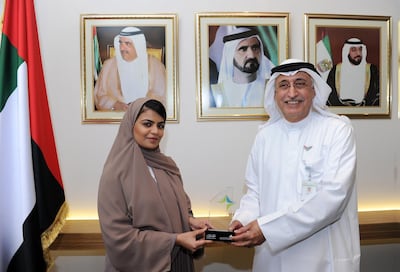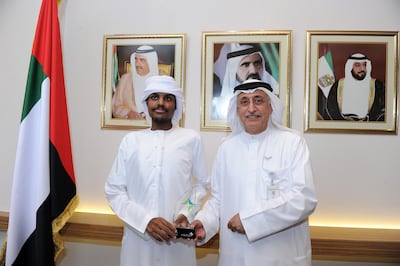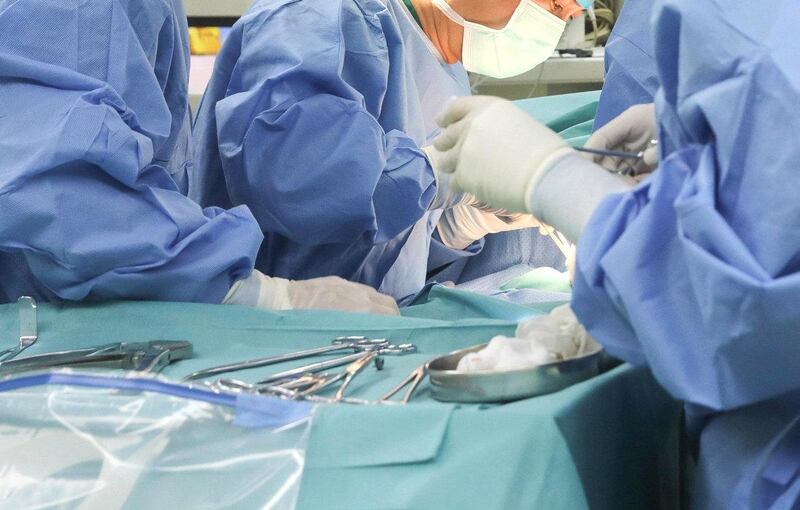The first life-saving organ transplant from a live patient in the UAE was successfully completed at Dubai Hospital.
Lawyer Ayesha Al Marzooq, 24, donated her left kidney to her brother, Khalid, 27, who suffered from an auto-immune disease that left him in need of kidney dialysis since 2016.
The regular, gruelling dialysis sessions had begun to take their toll on Mr Al Marzooq, who was unable able to work because of his illness.
“My health situation was really deteriorating, I used to get tired quickly and I couldn’t walk much,” he said.
"I am really thankful for my sister because my mental and physical health is much better than before.”
A six-hour procedure, completed on February 10 by a 25-strong medical team, has transformed the Emirati’s life.
Surgeons from the UAE and Italy operated on the siblings simultaneously.
Within 24 hours, the transplanted kidney was functioning almost as normal, and both patients have recovered well.
“My main concern when I woke up from surgery was that my brother felt better," said Ms Al Marzooq, who is also expected to lead a normal life, despite having just one functioning kidney.
“I am happy now that has a functioning kidney.
“The doctors gave me the positive energy and knowledge I needed before the procedure.
“That made me feel more comfortable with taking this big step and saving my brother’s life.”

Prior to the surgery, Mr Al Marzooq was one of more than 300 patients in Dubai reliant on regular hospital visits for dialysis treatment. But with less than 20 suitable donors in the UAE, most patients are left facing life-limiting hospital visits to flush-out faltering kidneys.
Dialysis sessions to rid the body of toxins, excess water, salts and sugars from the blood via urine, a process usually performed by healthy kidneys, can take up to four hours a time.
Although Ms Al Marzooq was released from hospital after just a few days, her brother was kept in for 10 days while doctors monitored how his body accepted his new functioning organ.
The live transplant surgery was a landmark case for Dubai Health Authority but the procedure is not new to the UAE.
Last year, doctors at Sheikh Khalifa Medical City said they had carried out 60 kidney transplant operations in 18 months with more than half, 35, from living donors.
Doctors at the DHA said techniques used in the latest surgery will become commonplace in the near future.

Medics took CT scans of Ms Al Marzooq’s working kidneys, creating a 3D model to determine which kidney was most suitable for transplant.
Fewer blood vessels on her left-sided organ made it more suitable for the procedure.
The model was also used to explain to the patients how the surgery would work.
Dr Yasser Al Saeedi, consultant urologist and robotic surgeon at Dubai Hospital, led his team in removing the healthy kidney from the donor using minimally invasive keyhole surgery with incisions just one centimetre in width.
“Instead of a patient donating a kidney with classical open surgery and staying in hospital for two weeks, Ayesha was home within four days,” he said.
“After carefully studying the 3D printed replicas we conducted a laparoscopic donor nephrectomy, which is the internationally preferred procedure for kidney removal in live donors.
“This surgery offers quick recovery, less pain, and a shorter hospital stay.”
The DHA organ transplant strategy aims to reduce death rates from organ failure from between 48-82 per cent.
Under the national transplant law, live organs can only be transplanted from a near relative: either a parent or sibling.
A liver transplant from a live donor is expected to take place in Dubai later this year.
“This transplant surgery is an important milestone as the kidney was from a living donor,” Dr Al Saeedi said.
“It is only the first step, but we need to develop this process in other organs.”
In January, the Ministry of Health and Prevention announced the opening of the Human Organs and Tissues Transplantation Centre at Al Qassimi Hospital, Sharjah.
The Centre is established in partnership with Mohammed Bin Rashid University of Medicine and Health Sciences under the National Programme for Organ Transplantation.
“I am sure the number of suitable donors in the UAE will begin to increase rapidly,” said Andrea Risaliti, general surgery consultant and chairman of Organ Transplant Committee at DHA.
“The law was only changed in 2016-17, so it will take time to progress.
“We can do a liver transplant from a living donor and we want to start a transplantation programme here in Dubai in 2020.”







